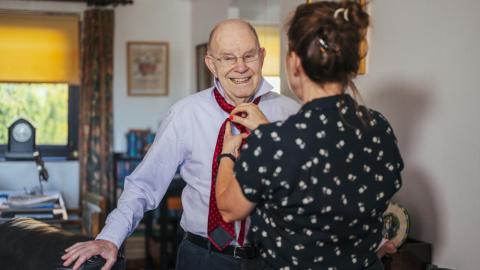
Advocacy helps you understand your rights and have your say. Advocates stand alongside you to make sure your voice is heard when decisions are made about your health, family, and wellbeing.
As an unpaid carer, you, and the person you care for, have the right to have your voice heard and your rights upheld. An advocate can help you navigate the social care system, communicate with professionals, understand your rights, make complaints, and be involved in decisions about your own care and the care of the person you support.
Self-advocacy
Some people prefer to self-advocate. Self-advocacy means speaking up for yourself, making sure your voice is heard and communicating your needs confidently. Carers UK has produced a detailed Self-Advocacy Guide to help you communicate with professionals, understand your rights, and look after your wellbeing.
Being Heard: A Self-Advocacy Guide for Carers
If you’d prefer to have someone to support you below is some more information about the types of advocacy and how to access it.
General Advocacy
A general advocate can help you speak up for yourself and access the services you need. They can support you to have your voice heard on issues such as accessing a service or making a complaint.
A general advocate can help you by:
• Telling others what you want
• Writing a report for the professional making a decision on your behalf
• Representing you during a best interest process
• Challenging decisions if they believe they were not made in your best interest
Care Act Advocacy
Care Act Advocates help people understand and uphold their rights under the Care Act 2014. This includes supporting people to be involved in all decisions about their care and support, such as local authority assessments, care reviews, care and support planning, or safeguarding processes.
You could be entitled to Care Act Advocacy if you find it difficult to access services and feel you are not being listened to.
A Care Act Advocate can help you to:
• Understand your rights to care and support
• Explore your options and choices
• Be fully involved in decisions about your care and support
• Challenge decisions around your care and support
How to Get Advocacy Support in Redcar & Cleveland and Middlesbrough
People First have advocacy hubs in Redcar & Cleveland and Middlesbrough. To find out more about the different types of advocacy available through the team, or to make a referral:

Visit their website https://wearepeoplefirst.co.uk/ Or call 0300 303 8037
Ellie Graham from People First shared with us what one person who has used advocacy had to say:
What advocacy means to you? “Having someone by your side when things get tough.”
When advocacy helps most? “At times when you feel alone and no one is helping you but an advocate can be by your side.”
What made Claire a good advocate? “She kept talking to me, kept me updated, and helped me tell others what was important to me.”
Teesside Mind also offer advocacy, and all referrals are made through People First.
Learn more about advocacy support through Teesside Mind on their website Advocacy for someone you know or care for
You can request to receive support specifically from Teesside Mind if you'd prefer.
Advocacy can make a real difference ensuring you are seen, heard, and supported in the decisions that matter most. Whether you choose to speak up for yourself or get help from an advocate, you don’t have to face the challenges of caring alone. Support is out there, and your voice matters.




